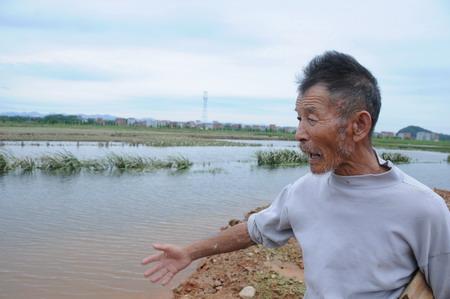
A farmer surveys his rice paddy flooded by heavy rains in Leping, Jiangxi province, on Saturday. Downpours that started on June 14 have affected 2.6 million people in more than 40 cities in the province. [Photo / China Daily]
Disastrous weather is likely to drive cost of agricultural products higherBEIJING - The torrential rains and flooding in China's southern provinces will have only a limited impact on rice production and will not threaten the country's food supply this year, experts and officials said on Tuesday.
But the rains and the previous drought are likely to reduce the yields of other agricultural commodities and send food prices soaring, putting fresh pressure on the country's stubbornly high inflation.
"Early rice may suffer because of the extreme weather this year," said Xu Xiaoqing, director of the department of rural economics at the Development Research Center (DRC) of the State Council.
"But it is still too early to see the extent of the impact on this year's early rice harvest," he said.
China had a record grain harvest of 546 million tons in 2010, the seventh consecutive yearly increase. Early rice accounts for no more than 30 million tons of the total grain production.
"China's grain supply for the market is unlikely to be affected by a loss of early rice production," said Fang Yan, deputy director general of the department of rural economy at the National Development and Reform Commission, China's top economic planner.
As long as the country can meet market demand, "such a small-scale reduction" is unlikely to cause any fluctuation in grain prices in the long term, she added.
In addition to early rice, the flood-hit provinces are also major growers of rapeseed and vegetables. The prices of fruit, vegetables and other agricultural products are likely to surge because of the disastrous weather, said Ma Wenfeng, a senior analyst at Beijing Orient Agribusiness Consultant Ltd, a major agricultural consulting company.
"The disaster will magnify inflation expectations in the market and make it more difficult for the government to curb inflation," Ma said.
China's consumer price index, the main gauge of inflation, rose to a record high of 5.5 percent in May, largely pushed by rising food prices, according to the National Bureau of Statistics.
As pressure mounts to rein in inflation, economists speculate that the People's Bank of China, the central bank, will raise interest rates next month for the fifth time since October.
The bank has raised the reserve requirement ratio each month since January.
Xu, from the DRC, said the government should introduce more measures to avoid bringing inflation down with a bump.
"Excessive tightening measures will hurt small and medium-sized companies and may even lead to economic stagnation," he said.
China has seen more and more extreme weather in recent years. In 2010, the southwestern provinces were struck by a severe drought, and winter wheat growing provinces in North China experienced unexpected cold.
This month, a rain-triggered flood, following a severe drought in the spring, hit provinces in downstream of the Yangtze River.
According to a statement released by the Ministry of Civil Affairs on Monday, 36.57 million people were affected by the disasters, and 1.64 million were displaced in 510 counties in 13 southern provinces.





